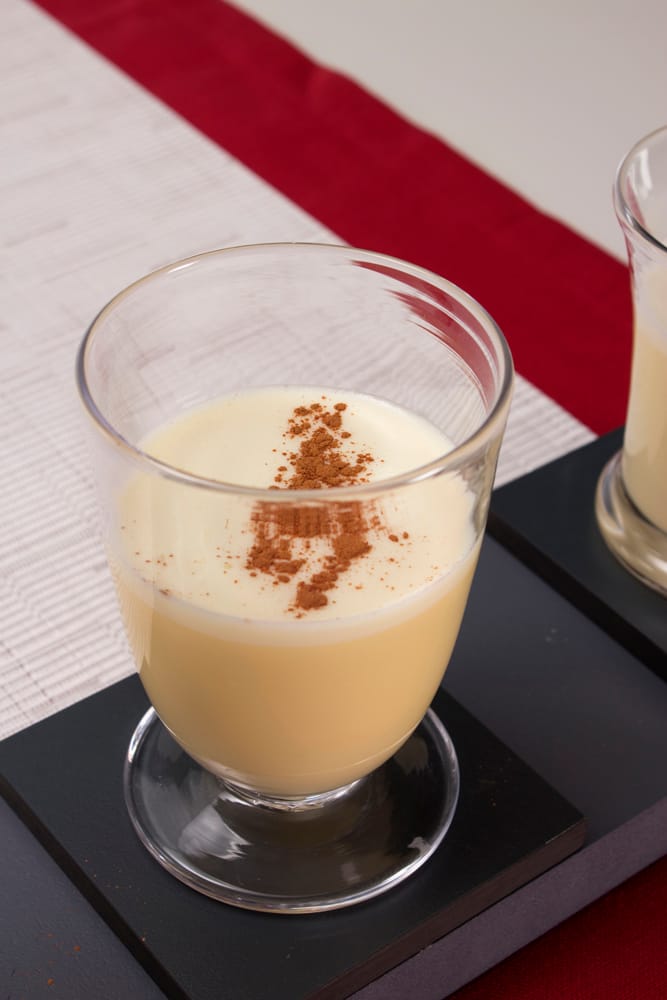eggnog

Whence comes the name for the drink we know as eggnog? The egg is easy enough—it is made with eggs, but the nog is a stumper for most casual observers of the language.
In an older entry, the Oxford English Dictionary dates eggnog to 1825, but the term has been antedated since that entry was written, and the term may date to before 1775. Jonathan Boucher, an English clergyman who resided in Virginia and Maryland from 1762–75, is supposed to have written a poem which incorporates dialectal words from Maryland while he was resident in the colonies. But the poem was not published until 1833, several decades after Boucher’s death, so its date of composition is not certain. It reads, in part:
Fog-drams i’ th’ morn, or (better still) egg-nogg,
At night hot-suppings, and at mid-day, grogg,
My palate can regale.
The glossary accompanying the 1833 publication contains a gloss of the term, probably written by the volume’s editors, Joseph Hunter and Joseph Stevenson:
Egg-nogg; a heavy and unwholesome, but not unpalatable, strong drink, made of rum beaten up with the yolks of raw eggs.
The earliest unassailable date of the appearance of eggnog was turned up by Yale law librarian Fred Shapiro and is from 1788, when the New Jersey Journal recorded the following on 26 March:
A young man with a cormerant [sic] appetite, voraciously devoured, last week, at Connecticut farms, thirty raw eggs, a glass of egg nog, and another of brandy sling.
On 29 June 1790, Hugh Williamson, a U. S. Representative from North Carolina made a speech in which he describes the stereotype of an old, sea captain spending his remaining days on shore. The old man’s diet is reminiscent of Boucher’s observation:
Egg-nog is his favourite liquor in the morning—grog at eleven o’clock—and such wine as he can afford after dinner, which generally consists of salt pork and pease, with sea biscuit instead of bread.
So we have eggnog appearing in the American colonies or the United States in the latter half of the eighteenth century. But these early citations don’t provide us with a clue as to the origin.
The OED gives the proximate origin of the second element in eggnog as the East Anglian dialectal word nog, referring to a strong variety of beer brewed in Norfolk. This East Anglian nog has been dated to 1693, but the trail ends there. Where this nog comes from is uncertain.
One likely source is noggin, a term for a mug or cup, and hence for a drink of liquor. (It also gives us the boxing slang for head, a sense which dates to 1769.) Noggin as container dates to 1588 and as a measure of spirits to 1648. But the origin of noggin is itself unknown. (The Gaelic noigean and Irish noigín, sometimes proffered as possibilities, are borrowed from English.) It may be from knag, a Scottish term for a small cask or barrel that dates to sometime before 1585, but origin this word is also unknown.
Another possibility is that nog comes from the Orkney and Shetland nugg or nugged ale, a drink warmed with a hot poker. That term may come from knagg, a Swedish, Norwegian, and Danish word for a peg. The OED also suggests that nog could be related to the verb to nudge, although the dictionary doesn’t make clear why this might be so. The phonetics are similar, but there is no apparent semantic link.
So we have a number of proximate possibilities for where the nog comes from, but the ultimate origin remains a total mystery.
Sources:
Boucher, Jonathan. Boucher’s Glossary. Joseph Hunter and Joseph Stevenson, eds. London: Black, Young, and Young, 1833, l. HathiTrust Digital Archive.
“Elizabeth-Town, March 26.” New-Jersey Journal (Elizabeth), 26 March 1788, 2/3. Readex: America’s Historical Newspapers.
Oxford English Dictionary, third edition, December 2003. s. v. nog, n.2, noggin, n.; nudge, v.; second edition, 1989. s. v. eggnog, n; knag, n.2.
Williamson, Hugh. Speech, 29 June 1790. The American Museum, or, Universal Magazine, September 1790, 140–142 at 142/2. HathiTrust Digital Archive.
Zimmer, Ben. “The Origins of ‘Eggnog,’ Holiday Grog.” Word Routes. Vocabulary.com. 24 December 2009.
Photo credit: Didriks, 2011. Wikimedia Commons. Flickr.com. Licensed under a Creative Commons Attribution 2.0 Generic license.